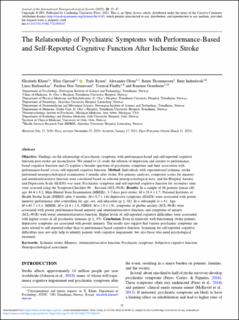| dc.contributor.author | Kliem, Elisabeth | |
| dc.contributor.author | Gjestad, Elise Ødegård | |
| dc.contributor.author | Ryum, Truls | |
| dc.contributor.author | Olsen, Alexander | |
| dc.contributor.author | Thommessen, Bente | |
| dc.contributor.author | Indredavik, Bent | |
| dc.contributor.author | Bieliauskas, Linas | |
| dc.contributor.author | Due-Tønnessen, Paulina | |
| dc.contributor.author | Fladby, Tormod | |
| dc.contributor.author | Grambaite, Ramune | |
| dc.date.accessioned | 2022-02-02T10:24:49Z | |
| dc.date.available | 2022-02-02T10:24:49Z | |
| dc.date.created | 2021-03-31T11:25:29Z | |
| dc.date.issued | 2021 | |
| dc.identifier.citation | Journal of the International Neuropsychological Society. 2021, 28 (1), 35-47. | en_US |
| dc.identifier.issn | 1355-6177 | |
| dc.identifier.uri | https://hdl.handle.net/11250/2976618 | |
| dc.description.abstract | Objective: Findings on the relationship of psychiatric symptoms with performance-based and self-reported cognitive function post-stroke are inconclusive. We aimed to (1) study the relation of depression and anxiety to performance-based cognitive function and (2) explore a broader spectrum of psychiatric symptoms and their association with performance-based versus self-reported cognitive function. Method: Individuals with supratentorial ischemic stroke performed neuropsychological examination 3 months after stroke. For primary analyses, composite scores for memory and attention/executive function were calculated based on selected neuropsychological tests, and the Hospital Anxiety and Depression Scale (HADS) was used. Psychiatric symptoms and self-reported cognitive function for secondary aims were assessed using the Symptom-Checklist-90 – Revised (SCL-90-R). Results: In a sample of 86 patients [mean (M) age: 64.6 ± 9.2; Mini-Mental State Examination (MMSE), 3–7 days post-stroke: M = 28.4 ± 1.7; National Institutes of Health Stroke Scale (NIHSS) after 3 months: M = 0.7 ± 1.6] depressive symptoms (HADS) were associated with poorer memory performance after controlling for age, sex, and education (p ≤ .01). In a subsample (n = 41; Age: M = 65.7 ± 8.1; MMSE: M = 28.4 ± 1.8; NIHSS: M = 1.0 ± 1.9), symptoms of phobic anxiety (SCL-90-R) were associated with poorer performance-based memory and attention/executive function, and symptoms of anxiety (SCL-90-R) with lower attention/executive function. Higher levels of self-reported cognitive difficulties were associated with higher scores in all psychiatric domains (p ≤ .05). Conclusion: Even in relatively well-functioning stroke patients, depressive symptoms are associated with poorer memory. The results also suggest that various psychiatric symptoms are more related to self-reported rather than to performance-based cognitive function. Screening for self-reported cognitive difficulties may not only help to identify patients with cognitive impairment, but also those who need psychological treatment. | en_US |
| dc.language.iso | eng | en_US |
| dc.publisher | Cambridge University Press | en_US |
| dc.rights | Navngivelse 4.0 Internasjonal | * |
| dc.rights.uri | http://creativecommons.org/licenses/by/4.0/deed.no | * |
| dc.title | The Relationship of Psychiatric Symptoms with Performance-Based and Self-Reported Cognitive Function After Ischemic Stroke | en_US |
| dc.type | Peer reviewed | en_US |
| dc.type | Journal article | en_US |
| dc.description.version | publishedVersion | en_US |
| dc.source.pagenumber | 35-47 | en_US |
| dc.source.volume | 28 | en_US |
| dc.source.journal | Journal of the International Neuropsychological Society | en_US |
| dc.source.issue | 1 | en_US |
| dc.identifier.doi | 10.1017/S1355617721000187 | |
| dc.identifier.cristin | 1901830 | |
| cristin.ispublished | true | |
| cristin.fulltext | original | |
| cristin.qualitycode | 1 | |

